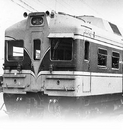The train's still coming for Ken Boothe
Published: Sunday | March 8, 2009

File
Ken Boothe as a young performer in 1975.
Mel Cooke, Gleaner Writer
The lines are now rusted and overgrown with weeds (and sometimes squatters); the cars are achingly still and the main station in downtown Kingston a rusted hulk. But when Ken Boothe wrote The Train is Coming in 1968 it was not an empty promise of a rail service that successive governments have pledged to revive.
It was a love song about leaving, loss and the promise of reunion which has endured the decline of the train service.
Ken Boothe wrote and sang to Jackie Mittoo's arrangement at Studio One:
"I say the train is coming baby
I say the train is coming now
Every day I pray for this little hour
Now the time has come and I want you to stand by me
Because the train is coming baby
I say the train is coming now
And we will roam this land ..."
Poor community
"We lived in a poor community, Denham Town," Boothe told The Sunday Gleaner. In terms of transportation beyond the regular motor vehicle "all we knew about was train. Anytime you going to swim or anything, you pass the train line. It was the closest thing to us as transportation."
Boothe pointed out that in those days, not many people were leaving Jamaica by plane. By ship, it took two weeks to reach England.
He went closer than just stepping over the steel rails, as "we could see it, touch it. We used to go down to the train station on Darling Street". There, Boothe and his friends got a chance to go on the engine, see how it worked and watch as the coal was fired up. He laughs as he tells The Sunday Gleaner that some of the engineers were rude, but some helped out the fascinated youngsters.
And as his songwriting skills developed, Boothe used what he saw and touched in The Train is Coming, which he describes as a "nice love song", commenting "and funny, it live so long".
It was recorded very shortly after being written, as Boothe says "Them time Downbeat groom me. Downbeat (Studio One) was a place you could just go in and record, Gaylads, Delroy Wilson, any one of us."
There is an outstanding tenor saxophone solo in The Train is Coming, Boothe saying that Sam who played has died.
Second lease on life
The Train is Coming got a second lease on life in a later era of Jamaican music via a remake with Shaggy, which appeared on his smash Boombastic album as well as in the 1995 movie Money Train, starring Wesley Snipes, Jennifer Lopez and Woody Harrelson. There was also a music video for the remake, the connection for the track to be done made by Shaggy's manager, Robert Livingston.
And Ken Boothe points out that "many people do it, like UB 40".
So while the engines and cars remain stationary, the train is still coming for Ken Boothe and his legion of fans who happily dance along as he twirls, twists and turns to an enduring image and emotion.

While Ken Boothe's The Train is Coming uses the now defunct railway system in Jamaica as its central focus, he is not the only Jamaican performer who has used the train in song.
Peter Tosh used it not only in lyrics but also in the video for his remake of Chuck Berry's Johnny B Goode. As the video, one of the early Jamaican projects to fuse music and visuals, opens with Tosh singing "deep down in Jamaica close to Mandeville" there is an image of a man running on a rocky ledge, racing against a puffing train below.
The train is recurrent throughout the video, its white steam rising from some bushes as Tosh sings about Johnny carrying his guitar "in a gunny sack, sitting in a tree in the railroad track". And there is a close-up shot of the wheels turning as Tosh sings that Johnny was "strumming to the rhythm that the drivers made".
This Train, done notably by Joseph 'Culture' Hill and Bunny Wailer, respectively (the latter closes his seminal Blackheart Man album with an extended slow cut), uses the image of the train as transportation to higher realms. On This Train certain people will not be accepted, as the song informs:
"This train is bound to glory
This train, carry no unholy ..."
The physical Jamaican train line figures in another sort of transition from the physical life, a very reluctant one. In the mid-1990s, Terror Fabulous sang about the fate of those who find themselves taken to a deserted killing spot in downtown Kingston. He opens Yu Woulda Bawl with the warning "Hey you, whe a programme wickedness, open oonu ears an listen". And he continues the warning with:
"If a Garden man hol' yu at de wrong time
An decide him a go tek yu pon de train line
Yu woulda bawl sey no murda me ..."
In that case, the train line trip is terminal instead of ending at a terminus.
- Mel Cooke

















